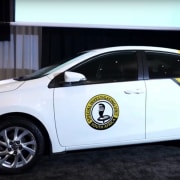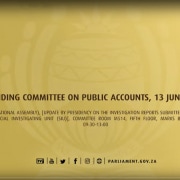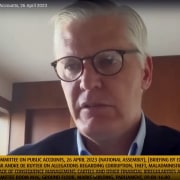|
Getting your Trinity Audio player ready...
|
The Eskom saga in its many forms has dominated much of the 2023 news cycle, as it has in years before. From Andre de Ruyter to organised crime, from the minister for electricity to load shedding, the lives of South Africans arguably revolve more around this one issue than any other – even corruption.
In June 2023 we reported on a parliamentary meeting between the Standing Committee on Public Accounts (Scopa), police commissioner Fannie Masemola, deputy police minister Cassel Mathale, and Special Investigating Unit (SIU) head Andy Mothibi. The meeting was to discuss the progress of SIU investigations into Eskom, arising from corruption and sabotage allegations made by former CEO Andre de Ruyter.
Another police official, then-brigadier Jap Burger – now retired – who came to the committee’s attention during De Ruyter’s own appearance in April this year, failed to show up after expressing discomfort at having to appear. De Ruyter had met with Burger in August 2022, and mentioned this to Scopa, saying that he had personally engaged with law enforcement and intelligence agencies to report the allegations. These engagements included the sharing of a privately funded information-gathering exercise on Eskom.
The committee subsequently invited all involved parties to share the extent of their knowledge, and the only one who did not do so was Burger.
Committee members were annoyed at Burger’s absence, and much of the discussion revolved around the situation and the brigadier’s apparent reasons in that regard. It was important that he meet with Scopa, they said, “in light of the many references to him and his knowledge of the information-gathering exercise at the national power utility”.
The committee gave Burger another chance to report to it in September, which he did not take up. He finally responded to a subpoena, meeting with Scopa on 15 November 2023 to discuss De Ruyter’s allegations of corruption, fraud, and maladministration at Eskom.
Anti-corruption work not supported in SAPS
Burger apologised to Scopa for what “might have been seen as avoidance” but which was not.
He began by briefly describing his 40-year career in the South African Police Service (SAPS), 24 of which were in anti-corruption work. One of his numerous tasks was to assist with the establishment of the Investigative Directorate within the National Prosecuting Authority.
However, during the years of his long career he noticed serious vulnerabilities in the SAPS approach to corruption. “We’ve got difficulties within the operational structures doing the [anti-corruption] work continuously being clamped down and not being supported … since 2021 I’ve been adrift. I contemplated early retirement because of no interest from police management in dealing with matters of serious corruption, specifically as it related to state capture.”
Having given that background, Burger said his reasons for not appearing before Scopa had been misrepresented. “It wasn’t a position of arrogance, but rather that I’m working from a contaminated space. The national commissioner misrepresented me.”
Burger, who had brought his own legal representative to the meeting, later said that if he had appeared when Scopa first invited him, he would have had to use a legal representative from the police, and this he was not willing to do. “Do you think my rights would have been protected? No.”
No commitment to address Eskom corruption
Moving on to Eskom corruption investigations, Burger said: “Are they [the police] addressing the problem? I can tell you they are not. They are trying to move the investigations down to a transactional nature and individualised dockets. We are not approaching these issues as a matter of national security interest. We’re not going to win the fight against corruption dealing with it like that.”
He was dissatisfied that the National Security Council had not got involved, given that in his view Eskom was a matter of national security. He went on to say that government departments had not done their work to protect the entity, adding that the government sector is highly “contaminated” by organised crime syndicates.
“We are working against deliberate resistance, but there’s also a failure in the government approach.”
Burger told Scopa that he had indeed engaged with De Ruyter but had not received any intelligence report arising out of a privately funded investigation. The pieces of information that he did receive could not be validated, partly because of lack of co-operation from the State Security Agency, and so he passed them to the Eskom team from the Directorate for Priority Crime Investigation.
Burger stressed the important of collective action against corruption. “I’ve got a very strong belief we can address it, but we have to put our heads together and stop functioning as individuals or individual parties. This is a collective responsibility.”
He said he was willing to share his knowledge and experience with other committees and entities. “I want to reiterate my willingness to meet with the joint standing committee on intelligence and other oversight mechanisms at their earliest convenience.”
The committee thanked Burger for his co-operation and committee chairperson Mkhuleko Hlengwa requested a draft report by the end of November. Scopa will meet in two weeks’ time to discuss the way forward in terms of its Eskom investigation, which is now concluded.








